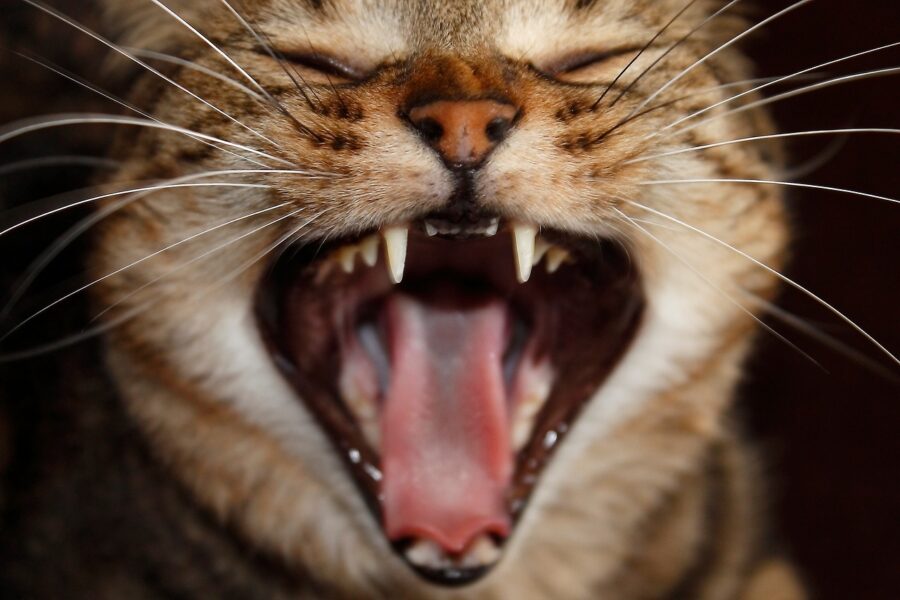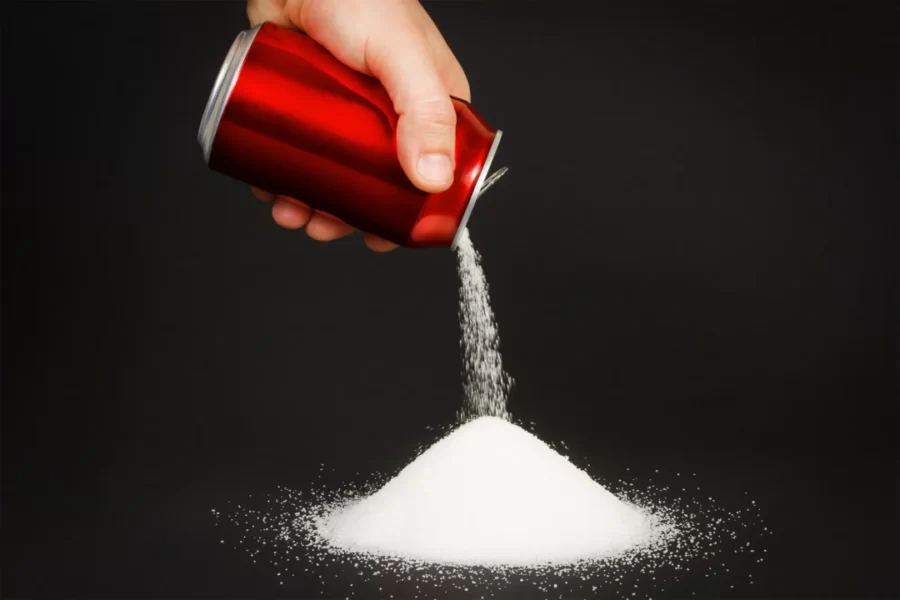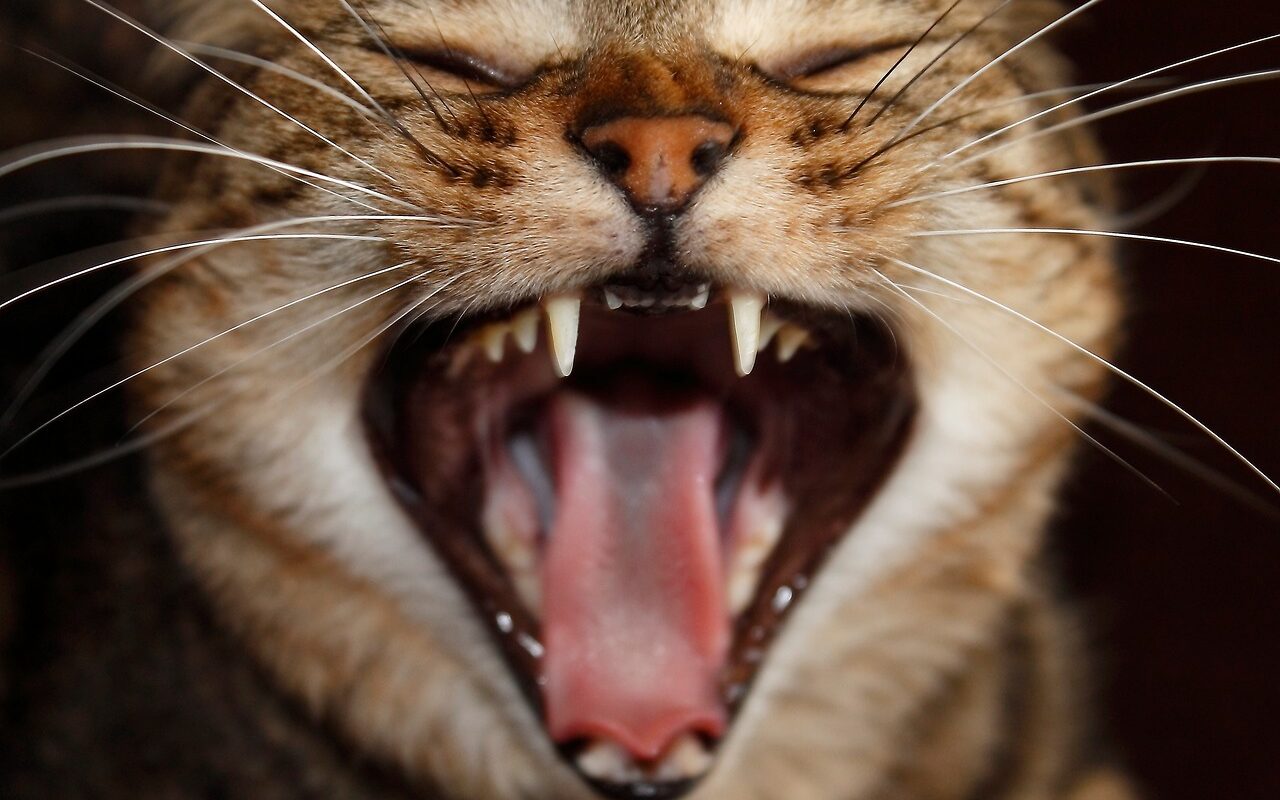Due to its portability and palatable flavor, canned food has gained popularity among cat owners. Cats find it enticing because of the variety of tastes and textures it provides. However, many people worry about the effects of canned food on their cat’s teeth. Is canned food bad for a cat’s teeth? That’s what this article seeks to find out. Here, we’ll talk about how canned food affects your cat’s teeth and gums, and provide some advice for keeping your cat’s mouth clean.
Understanding the Nature of a Cat’s Teeth
Cats have a total of 30 teeth, which are designed to fulfill various functions. These teeth can be classified into three types: incisors, canines, and premolars/molars. Incisors are located at the front of the mouth and are responsible for biting and grooming. Canines are the long, pointed teeth located on the sides of the incisors. They are designed for tearing and gripping prey.

Premolars and molars, situated towards the back of the mouth, have flat surfaces that aid in shearing and grinding food. It’s worth noting that cats have specialized teeth known as carnassial teeth, which are located in the upper and lower jaws. These teeth have sharp edges that enable them to efficiently slice through meat.
Common Dental Issues in Cats
Tartar buildup: Like humans, cats are prone to developing tartar, a hardened deposit of bacteria and food particles that accumulates on the teeth over time.
Gingivitis: Inflammation of the gums, known as gingivitis, can occur due to poor oral hygiene. This condition is characterized by red, swollen, and sometimes bleeding gums.
Periodontal disease: If left untreated, gingivitis can progress into periodontal disease. This condition involves the destruction of the structures supporting the teeth, including the gums, tooth sockets, and periodontal ligament.

Consequences of Dental Problems
Pain and discomfort: Dental issues can cause significant pain and discomfort for cats, leading to reluctance to eat, drooling, pawing at the mouth, and changes in behavior.
Tooth loss: Severe dental problems can result in tooth loss, affecting a cat’s ability to chew properly and impacting their overall health and nutrition.
Systemic health issues: Poor oral health in cats can have broader health implications. Bacteria from dental infections can enter the bloodstream, potentially affecting vital organs such as the heart, liver, and kidneys.
Advantages of Canned Food | Cat Teeth
Moisture content: Canned food’s high moisture content benefits cats, particularly those who don’t drink enough. Since cats have low thirst drives and urinary tract difficulties, this is crucial for hydration. Canned food keeps you hydrated and supports renal function.
Palatability: Canned cat food is tasty and fragrant. Even fussy cats like its rich flavors and textures. The soft texture makes it simpler to chew and swallow for cats with dental issues or reduced appetites.
Nutritional balance: High-quality canned cat food provides a balanced and comprehensive feline diet. They include proteins, lipids, vitamins, and minerals for general health and particular life phases or health issues. Many companies provide weight management, urinary health, and geriatric cat formulations.
Digestibility: Canned cat food components are usually cooked at high temperatures. Cats may absorb proteins and carbs better after cooking. This helps cats with intestinal difficulties.
Disadvantages of Canned Food | Cat Teeth
Cost: Canned cat food costs more. Cat owners on a budget or with many pets should consider this. Canned food’s increased price may restrict the cat’s nutritious intake.
Storage and shelf life: Canned cat food must be stored properly. After opening, refrigerate and eat within two to three days. If you have a little cat or require smaller portions, this might be difficult. Due to storage constraints, purchasing canned food in quantity may not be possible.

Dental health concerns: Canned food’s smooth texture may help cats with dental difficulties, but it doesn’t clean like dry kibble. Dry kibble removes plaque and tartar, improving tooth health. To maintain oral hygiene, canned food may not be enough.
Potential for food allergies or sensitivities: Some cats are allergic to grains, chemical additives, or protein sources in canned cat food. Finding the correct brand or formula for your cat’s food may be time-consuming and expensive.
Impact on Dental Health | Cat Teeth
The impact of canned food on dental health is a subject of debate among experts. While it may not provide the same mechanical cleaning action as dry kibble, canned food can still have an impact on dental health in both positive and negative ways. Here are some key points to consider:
Soft texture reduces the risk of tooth fractures or injuries: Canned cat food is soft and moist, reducing tooth fractures and injuries. This helps cats with dental difficulties, lost teeth, or dental damage. No firm kibble reduces tooth strain at meals.
Moisture content helps reduce plaque and tartar buildup: Canned food’s high moisture content reduces plaque and tartar development. The wet texture loosens and washes food and germs, reducing tooth issues. Canned food alone may not clean your cat’s teeth.
Lack of abrasive action for cleaning teeth: Canned meal doesn’t scrub teeth like dry kibble. Dry kibble cleans teeth as it is eaten. This improves oral hygiene. Toothbrushing and dental toys may help make up for the absence of abrasive activity.
Importance of overall dental care routine: Canned food should be part of a comprehensive oral care programme. Plaque and tartar accumulation may be prevented using feline-specific toothbrushes and toothpaste. Veterinarian dental checkups may also detect and treat dental concerns early on.
Maintaining Dental Health with Canned Food
While canned food alone may not provide the same level of dental care as dry kibble, there are steps you can take to promote good dental health while feeding your cat canned food. Here are some tips:
Regular dental check-ups: Veterinarians should inspect teeth annually. Regular dental exams uncover dental abnormalities early and enable treatment or prevention.
Tooth brushing: Cats need frequent dental cleaning. Vet-recommended kitty toothbrush and toothpaste. Let your pet adjust slowly. Brushing your cat’s teeth twice or three times a week helps eliminate plaque and tartar.
Dental treats and toys: Give dental toys and sweets. While chewing, these items clean teeth and massage gums. Veterinarian dental associations recommend treats and toys for safety and efficacy.
Water additives and oral rinses: Use cat dental health water additives or oral rinses. These products minimise plaque, tartar, and bad breath. Ask your vet for cat-friendly solutions.
Conclusion
In conclusion, can food can play a positive role in maintaining a cat’s dental health when incorporated into a comprehensive dental care routine. While the texture and moisture content of canned food contribute to healthier teeth and gums, it is crucial not to overlook other essential dental care practices such as regular brushing and professional cleanings. Dr. Chirag Chamria’s expert opinion at Royal Dental Clinics emphasizes the significance of a balanced approach to feline dental health, ensuring our furry friends can enjoy healthy and happy lives with strong, sparkling teeth.
© All rights reserved by Royal Dental Implants Pvt Ltd
Issued in public interest






